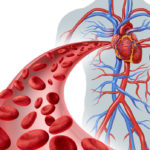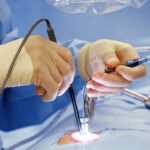As with all surgical procedures, heart valve surgery does have risks, despite the highest standards of surgical practice. While your surgeon makes every attempt to minimise risks, complications can occur, and some may have permanent effects. It is not feasible for a surgeon to outline every possible or rare complication of the operation. However, it is important you have enough information to fully weigh up the benefits and risks of surgery. As complications are unusual, most patients will not have a complication, but if you have concerns about possible side effects, discuss them with your surgeon. The surgical risks of death and serious complications increase with age, other significant illnesses, heart damage, urgency of operation, the need for other heart surgery (such as coronary artery bypass grafting) and recurrent surgery.
The following possible complications are listed for your information. There may be others that are not listed. You may wish to discuss the frequency and consequences of these complications with your surgeon.
EARLY RISKS AFTER SURGERY
Mortality: For an otherwise healthy person under 70 years of age, the risk of dying during or after heart valve surgery is about one to two in every 100 procedures. However, in the case of a badly malfunctioning valve, a decision to NOT have the surgery will carry a much higher risk of serious debility and consequent early death.
Stroke: Although stroke is uncommon, the risk increases with age and disease of the aorta. The effects of stroke may be temporary and resolve over a few days, or may be permanent and include:
- loss of feeling in a part of the body .:. paralysis of one side of the body or an arm or leg (the paralysis may be complete or partial)
- speech difficulty
- visual disturbances.
Cognitive dysfunction: About one patient in three may have some difficulty with concentration or blurred vision after valve surgery. This may last for three to four weeks. A permanent effect on concentration or vision is unlikely.
Bleeding: About three patients in 100 may require further surgery to control excessive bleeding. In most cases, this results in no adverse effects.
Arrhythmia (irregular heart beats): The most common arrhythmia in the first postoperative week is atrial fibrillation, which can affect up to one in three patients. It is usually treated with medication. Occasional extra beats are common and not a cause for concern. Uncommonly, a serious irregular rhythm can occur and may require an electrical shock to correct it. In rare cases, a permanent pacemaker may have to be implanted to control the heart rate. If you feel palpitations after you go home, speak with your cardiologist. If the palpitations do not subside after a few minutes or if you are feeling unwell or dizzy, call an ambulance.
Non-healing of the breastbone: Uncommonly, the bone may not heal normally. This is more likely following protracted coughing after surgery. In some cases, the wire sutures may pull out. Surgery to repair the bone may be necessary. This complication can also be caused by infection of the breastbone.
Infection of the breastbone: Treatment of infection of the breastbone usually requires re-hospitalisation, prolonged administration of antibiotics and often surgery.
Scarring: Most incisions heal well, but a few people develop raised or widened scars. Infection in the wound or areas of movement increases the risk of adverse scarring.
Blood clots: A clot may form in a deep vein, most often in the leg or thigh (deep venous thrombosis, or DVT). DVT requires immediate treatment and can be life threatening in some cases.
Areas of collapsed lung: These typically respond to physiotherapy.
Chest wall pain: This usually resolves by four to six weeks after the surgery. Kidney failure: In those patients with previously normal kidney function, this is a rare complication.
Mood swings: It is common for patients to have some anxiety and loss of confidence related to their heart and general health, but this usually improves during the weeks following surgery.
Other risks: Although uncommon, numerous other risks of heart valve surgery exist, including:
- respiratory failure and the need for a tracheostomy
- blood infection
- accumulation of fluid around the heart and in lung cavities that may require further drainage
- accumulation of air in the chest (pneumothorax) requiring temporary tube drainage.
LATE RISKS AFTER SURGERY
Bacterial endocarditis: The heart chambers and valves are covered with a membrane called the endocardium. As mentioned on page 3, patients with a diseased heart valve or an artificial valve are at risk of an infection developing on the valve. This is called infective endocarditis and is a very serious condition. Therefore, to reduce the likelihood of it happening, it is important that, for the rest of your life, you take prophylactic antibiotics before all dental or surgical procedures, no matter how minor, including endoscopy or removal of a skin lesion. If you have an artificial valve, always tell your dentist and other doctors so they can take appropriate precautions.
Valve failure: Rarely, a mechanical valve malfunctions, requiring urgent surgery to replace it. If a tissue valve fails, it does so more slowly and progressively.
Peri-valvular leak: Rarely, a small leak can develop between the valve prosthesis and where the valve has been sewn ~ in. In some cases, further surgery may be needed to correct the problem.
Haemolysis: This rare problem causes anaemia and occasionally mild jaundice. It is more likely to occur if the complication of peri-valvular leak develops late after heart valve surgery.
SYMPTOMS TO BEWARE OF Contact your surgeon or cardiologist at once if you develop any of the following:
- fever (more than 38°C) or chills
- night sweats
- loss of appetite
- joint pains
- bleeding from the surgical area
- blood in urine, or dark or black stools
- a wound that drains for more than a day
- increasing pain or redness of a wound
- severe headache
- sudden breathlessness
- persistent or frequent palpitations
- dizziness or blackouts
- eye symptoms, such as loss of vision or spots in front of your eyes
- weakness in any part of your body or slurring of speech
- any other concerns you may have about the surgery.



